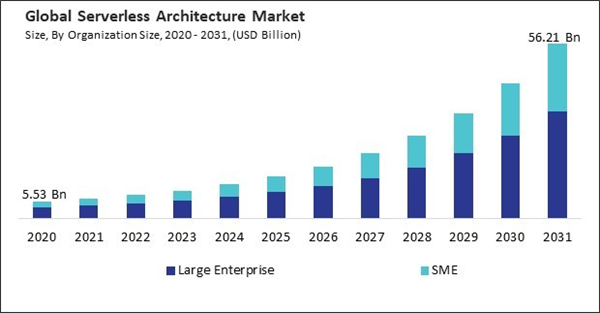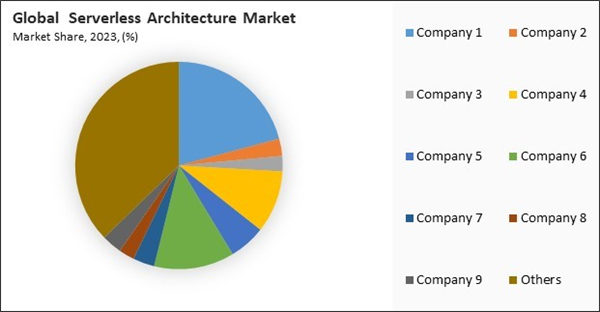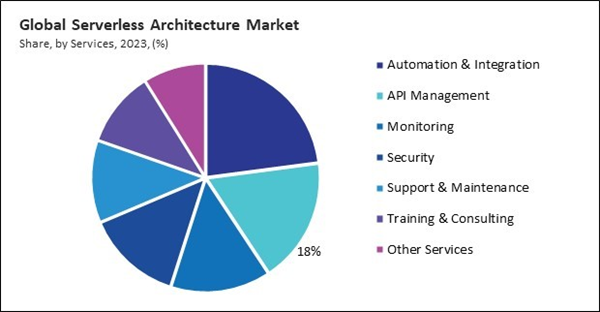The North America region witnessed 37% revenue share in the market in 2023. The presence of major cloud service providers like Amazon Web Services (AWS), Microsoft Azure, and Google Cloud has played a pivotal role in the growth of serverless architecture in North America. The region’s businesses, particularly in sectors such as BFSI, healthcare, retail, and government, increasingly leverage serverless technologies to streamline operations, reduce costs, and enhance scalability.
The growing shift towards cloud computing has created significant demand for this architecture as businesses seek to minimize IT infrastructure costs. Serverless computing eliminates the need for organizations to invest in physical servers and infrastructure, as well as the associated maintenance costs. This on-demand resource model allows companies to scale their computing power based on needs without worrying about provisioning servers in advance. Thus, increased demand for cost-effective cloud computing solutions is propelling the market's growth.
Additionally, Developing a wide range of serverless-ready tools and frameworks also fuels the rise of this architecture. These tools simplify the deployment, management, and monitoring of serverless applications, enabling developers to focus more on building and optimizing applications instead of worrying about infrastructure management. Popular serverless frameworks such as AWS Lambda, Azure Functions, and Google Cloud Functions provide developers with ready-to-use solutions, which reduces the barriers to adoption. Therefore, the rapid proliferation of serverless-ready development tools and frameworks drives the market's growth.
However, One of the key challenges for this architecture lies in its inherent latency issues, especially the cold start problem. When a serverless function is triggered after a period of inactivity, it may experience a delay in startup time, known as a cold start. This latency can impact performance, particularly in applications that require real-time responsiveness, such as gaming, financial transactions, or customer service platforms. In conclusion, performance bottlenecks and cold start latency are hampering the market's growth.
The leading players in the market are competing with diverse innovative offerings to remain competitive in the market. The above illustration shows the percentage of revenue shared by some of the leading companies in the market. The leading players of the market are adopting various strategies in order to cater demand coming from the different industries. The key developmental strategies in the market are Acquisitions, and Partnerships & Collaborations.
Driving and Restraining Factors
Drivers- Increased Demand For Cost-Effective Cloud Computing Solutions
- Rapid Proliferation Of Serverless-Ready Development Tools And Frameworks
- Expansion Of The Digital Transformation Worldwide
- Performance Bottlenecks And Cold Start Latency
- Limited Control And Customization Of Infrastructure
- Increased Focus On Application Scalability And Flexibility
- Emerging Demand For Microservices Architecture
- Challenges Related To Vendor Lock-In And Lack Of Portability
- Increased Complexity In Debugging And Monitoring
Deployment Outlook
On the basis of deployment, the market is segmented into public cloud, private cloud, and hybrid cloud. In 2023, the hybrid cloud segment attained 17% revenue share in the market. Hybrid cloud deployment allows businesses to leverage the scalability of public cloud platforms while maintaining sensitive data and mission-critical applications in private environments. This approach addresses data sovereignty and compliance requirements, making it particularly appealing to finance, healthcare, and government industries.Services Outlook
Based on services, the market is divided into automation & integration, API management, monitoring, security, support and maintenance, training and consulting, and others. The security segment acquired 14% revenue share in the market in 2023. As serverless applications are deployed to manage sensitive and business-critical information, safeguarding them from vulnerabilities has become a top priority for enterprises. Security services encompass advanced threat detection, data encryption, access controls, and compliance management.Organization Size Outlook
Based on organization size, the market is categorized into large enterprises and SME. The SME segment witnessed 37% revenue share in the market in 2023. SMEs often face budget constraints and limited IT resources, making this architecture an ideal solution to reduce upfront infrastructure costs and simplify application development. By adopting serverless technologies, SMEs can focus on core business activities while enjoying the flexibility to scale their operations as needed.Vertical Outlook
By vertical, the market is divided into BFSI, government & public, healthcare & life sciences, manufacturing, media & entertainment, retail & ecommerce, telecom & IT, and others. The retail & ecommerce segment held 18% revenue share in the market in 2023. Retailers benefit from serverless platforms by enabling real-time inventory management, personalized marketing, and efficient order processing. A significant advantage is the ability to scale applications seamlessly during peak shopping seasons or promotional events.Regional Outlook
Region-wise, the market is analyzed across North America, Europe, Asia Pacific, and LAMEA. In 2023, the Asia Pacific region generated 26% share in the market. Countries such as China, India, Japan, and South Korea are at the forefront of embracing cloud-native technologies, including serverless architecture, as they strive to modernize their IT infrastructure and improve operational efficiency. The increasing number of e-commerce platforms, mobile applications, and digital services drives demand for flexible, scalable, and cost-efficient solutions like this architecture.Recent Strategies Deployed in the Market
- Dec-2024: Microsoft Azure unveiled serverless GPUs in Azure Container Apps, using NVIDIA A100 and T4 GPUs for scalable AI inferencing and ML tasks. This managed platform enables flexible deployment, scale-to-zero capabilities, per-second billing, and seamless Azure integration, competing with providers like Google Cloud Run, Modal, and RunPod for GPU acceleration.
- Apr-2024: Cloudflare, Inc. announced the acquisition of Baselime to enhance serverless application observability. Baselime's platform simplifies understanding distributed systems with high-cardinality data and OpenTelemetry. Combined with Cloudflare’s developer-focused ecosystem, including Workers, R2, and D1, this synergy aims to embed observability by default, empowering developers to build, ship, and troubleshoot seamlessly across the connectivity cloud.
- Apr-2024: Cloudflare, Inc. announced the acquisition of PartyKit, enhancing serverless computing with real-time, stateful capabilities. By leveraging Durable Objects and simplifying WebSockets, PartyKit enables seamless development of multiplayer games, collaborative tools, and real-time applications. This integration empowers developers to build scalable, low-latency experiences, redefining serverless computing for a dynamic, interactive, and stateful future.
- Jan-2024: Alibaba Cloud introduced a serverless version of its AI platform, PAI-Elastic Algorithm Service (EAS), cutting inference costs by 50%. It also integrated vector engine technology into Hologres, Elasticsearch, and OpenSearch, enhancing access to large language models (LLMs) for customized AI applications, supporting Retrieval-Augmented Generation (RAG) for improved enterprise efficiency and decision-making.
- May-2023: Vercel Inc. announced the partnership with Neon to launch Vercel Postgres, a serverless SQL database for frontend development. This integration enables developers to build scalable, low-latency web applications using Neon's Serverless Postgres with Vercel’s platform. With scale-to-zero pricing and Next.js compatibility, it offers a cost-effective, end-to-end solution for modern web applications.
List of Key Companies Profiled
- Amazon Web Services, Inc. (Amazon.com, Inc.)
- Cisco Systems, Inc.
- Datadog, Inc.
- Google LLC (Alphabet Inc.)
- IBM Corporation
- Microsoft Corporation
- Oracle Corporation
- Dynatrace, Inc.
- TIBCO Software, Inc. (Vista Equity Partners Management, LLC)
- NTT Data Corporation
- Alibaba Cloud (Alibaba Group Holding Limited)
- Cloudflare, Inc.
- Vercel Inc.
Market Report Segmentation
By Organization Size- Large Enterprise
- SME
- Public Cloud
- Private Cloud
- Hybrid Cloud
- Automation & Integration
- API Management
- Monitoring
- Security
- Support & Maintenance
- Training & Consulting
- Other Services
- BFSI
- Retail & Ecommerce
- Media & Entertainment
- Telecom & IT
- Government & Public
- Healthcare & Life Sciences
- Manufacturing
- Other Vertical
- North America
- US
- Canada
- Mexico
- Rest of North America
- Europe
- Germany
- UK
- France
- Russia
- Spain
- Italy
- Rest of Europe
- Asia Pacific
- China
- Japan
- India
- South Korea
- Australia
- Malaysia
- Rest of Asia Pacific
- LAMEA
- Brazil
- Argentina
- UAE
- Saudi Arabia
- South Africa
- Nigeria
- Rest of LAMEA
Table of Contents
Companies Mentioned
- Amazon Web Services, Inc. (Amazon.com, Inc.)
- Cisco Systems, Inc.
- Datadog, Inc.
- Google LLC (Alphabet Inc.)
- IBM Corporation
- Microsoft Corporation
- Oracle Corporation
- Dynatrace, Inc.
- TIBCO Software, Inc. (Vista Equity Partners Management, LLC)
- NTT Data Corporation
- Alibaba Cloud (Alibaba Group Holding Limited)
- Cloudflare, Inc.
- Vercel Inc.











